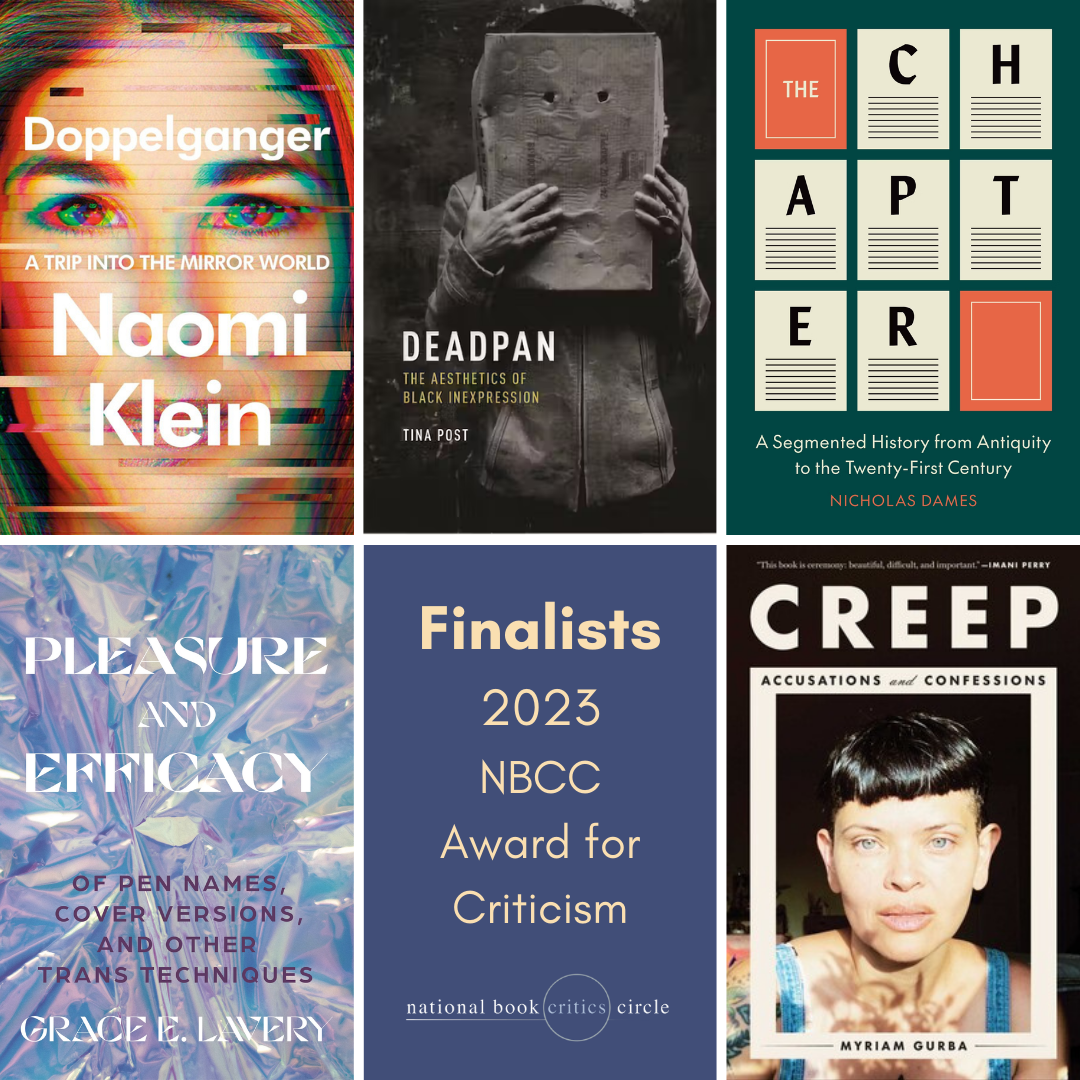Each year, our board members write citations of the finalists for the National Book Critics Circle Awards in a feature we call 30 Books in 30 Days. We’re honored to kick off this year’s edition with brief reflections on the finalists in our criticism category.
Nicholas Dames, The Chapter: A Segmented History from Antiquity to the Twenty-First Century (Princeton University Press)
1.) One of the most thrilling things a book of criticism can do is answer a question that you didn’t know you had. 2.) The question in The Chapter is particularly delicious, because you likely accept chaptering as a matter of course, without asking why books are split up. 3.) Nicholas Dames roams wonderfully from the Gospels to, in a particular highlight, George Eliot. He explores time, transitions, and the literal manufacturing of books. 4.) Dames is also a clear, lucid writer. 5.) The critical cliché in this case is true: after reading The Chapter, you will never quite read anything else the same way.
Myriam Gurba, Creep: Accusations and Confessions (Avid Reader Press)
Creep is the very rare book of essays that could easily read as a single full-length study. Across her works to date (Mean, Dahlia Season) Myriam Gurba has developed a control over tone that lets her combine all of Creep’s elements—the creeping presence of Richard Ramirez, the itching fear of lice, anti-Mexican racism everywhere, cold Joan Didion beside the hot Los Angeles strawberries, Gurba teaching her high school students that that rape is about geography, not sex—into a coherent portrait in local sensibility. Creep is a tricky book that reads easy.
Naomi Klein, Doppelganger: A Trip into the Mirror World (Farrar, Straus and Giroux)
Naomi Klein has long challenged readers to look at the way we live from a slightly skewed angle in hopes of ultimately making the world more just. In this masterwork of storytelling, reporting, criticism, and analysis, she uses the idea of the twin, or the fun house version of our own world, to explore how truth works—or doesn’t—in today’s political and cultural climate. “It’s tough to live in a moment when so many truths that had been sold as settled suddenly become wobbly,” she writes. In this time of uncertainty we’re lucky to have her be one of our guiding voices.
Grace E. Lavery, Pleasure and Efficacy: Of Pen Names, Cover Versions, and Other Trans Techniques (Princeton University Press)
Pleasure and Efficacy provides a groundbreaking study of the idea of gender transition in the modern era. Grace E. Lavery, a literary scholar and prominent activist, marshals a kaleidoscopic array of examples—from pseudonyms to psychoanalysis to The Silence of the Lambs—in support of her claim that sex change is possible. By turns playful and polemical, Lavery unpacks complex theoretical texts with an efficacy that is as astonishing to behold as it is pleasurable to read: a bold affirmation of the trans condition.
Tina Post, Deadpan: The Aesthetics of Black Inexpression (NYU Press)
Deeply researched and refreshingly lucid, Tina Post’s Deadpan arrives as one of the most original and affecting aesthetic surveys in recent memory. Long consigned to the realm of play-it-straight humor, the book recontextualizes the act of withholding to taxonimize its origins and uses—specifically the tact it assumes when intersecting with blackness. Refusing to differentiate between “embodied blackness (or blackness as performed by black people) and symbolic blackness (or blackness in the cultural imaginary),” the author instead maps the many tributaries connecting the one to the other, illuminating how specimenization, perceived threat, gradients, and the tension between excess and absence evolve and get repurposed by black and white artists alike.


